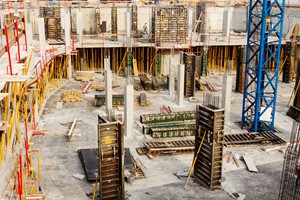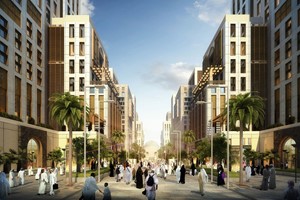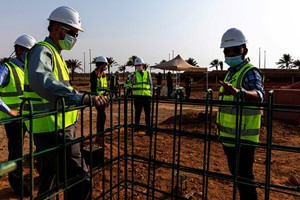Demand for building materials in the UAE is projected to rise steadily amid a construction surge and the initiation of new projects by property developers, according to a senior executive. Dubai is constructing a new terminal at Al Maktoum Airport, with a total investment of Dh128 billion ($34.8 billion), aiming to expand its capacity to 260 million passengers. Developers, including Emaar Properties, have announced projects in the vicinity to meet the anticipated increase in buyer demand.
Furthermore, developers have unveiled new projects across other parts of the Emirates as property demand continues to grow alongside rising prices. "The new terminal airport in Dubai ... all the developments in Abu Dhabi are showing quite healthy demand. We expect that demand to grow for the foreseeable future," said Hugo Losada, Chief Executive of Building Materials at Emirates Steel Arkan. He made these remarks to The National during the Make it in the Emirates forum, which concluded in Abu Dhabi on Tuesday.
Emirates Steel Arkan reported Dh1 billion in sales of building materials in the UAE last year and anticipates a 5 to 10 percent growth in sales in 2024, driven by new construction projects, according to Mr. Losada. "We expect single-digit growth in sales because of the construction boom that’s happening."
Listed on the Abu Dhabi Securities Exchange, Emirates Steel Arkan is the largest public steel and building materials business in the UAE. The company manufactures steel, cement, concrete blocks, and PVC pipes used in the construction industry. It was formed from the merger of Emirates Steel and Arkan Building Materials in 2021.
The building materials division contributes 20 to 25 percent to Emirates Steel Arkan's overall profit and 10 to 15 percent to its total revenue, according to Mr. Losada. Emirates Steel Arkan recorded a net profit of Dh601.9 million last year, with revenue reaching Dh8.9 billion. The building materials division accounted for Dh871 million in revenue and Dh145 million in profit.
Internationally, the company exports building materials to countries such as Bangladesh and Sri Lanka. It owns the largest cement factory in the country, located in Al Ain, with a capacity of 4.6 million tonnes. Emirates Steel Arkan also operates plants in Abu Dhabi that manufacture pipes and concrete blocks.
The company is contributing to the Make it in the Emirates initiative and Operation 300bn, which aims to position the country as an industrial center by 2031, Mr. Losada said. "We have a very high level of in-country value because the raw materials are mainly sourced locally, in terms of cement, in terms of blocks," he noted.
Launched in 2021, Operation 300bn aims to increase the industrial sector's contribution to GDP to Dh300 billion by 2031, from Dh133 billion in 2021. The UAE industrial sector's contribution to GDP reached approximately Dh197 billion last year, achieving 30 percent of Operation 300bn’s target thus far.
Mr. Losada highlighted Emirates Steel's significant role in Abu Dhabi's manufacturing industry, contributing 11 percent. While the company sources some components for pipes from abroad, it aims to start sourcing them locally soon. Last year, Emirates Steel Arkan spent Dh2.4 billion on local procurement, an increase of 34 percent compared to the previous year. The company buys scrap locally for recycling as part of its decarbonization drive, along with limestone and other raw materials, Mr. Losada stated. By sourcing locally, the company reduces emissions since products do not need to be transported over long distances. "Local purchase by the end of the day is a win-win solution for us as well," he added.
Meanwhile, Dubai Industrial City, part of the Dubai-listed Tecom Group, attracted investments worth Dh2.8 billion over the past 18 months as the UAE continues to focus on growing the industrial sector and attracting more investment. Investments flowed into sectors including food and beverages, building materials, transport, and machinery equipment, according to Saud Alshawareb, Executive Vice President of Industry at the Tecom Group. "The ecosystem that we provide – the ease of doing business, being close to one of the busiest ports in the world, which is Jebel Ali port, as well as Al Maktoum airport – helps companies to boost exports because of better connectivity," he said.
The new comprehensive economic partnership agreements (Cepas) signed by the UAE with various countries, including India, Turkey, and Indonesia, also facilitate the export of "Made in UAE" products to different markets at competitive prices, Mr. Alshawareb noted. The UAE has signed 10 Cepas so far with countries in Asia, Africa, and Latin America.
Dubai Industrial City also acquired 13.9 million square feet of new land from Dubai Holding Asset Management for Dh410 million amid higher demand. "This was mainly because of last quarter, the inventory of land that we had, occupancy wise had reached 97 percent," Mr. Alshawareb said. "So, this was an immediate reaction from our side to launch that 13.9 million to cater to the demand of the industrial companies that are willing to expand and grow within Dubai."
Currently, there are more than 300 operational factories in Dubai Industrial City, with over 1,000 business partners utilizing its facilities.
By Fareed Rahman














